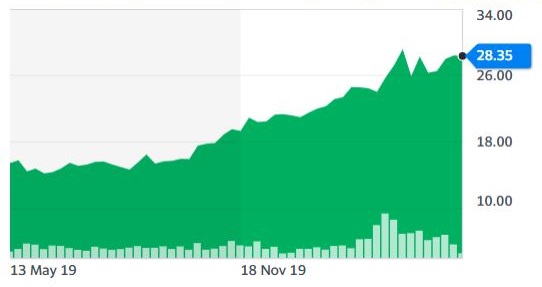Fisher & Paykel Healthcare stands out as a locally listed company that is playing a big role in the fight against COVID-19. It was also a stock that performed strongly during the recent market downturn.
Fisher & Paykel Healthcare Corporation Limited (FPH)

Source: ASX and Yahoo! Finance, as at 15 May 2020.
The Australian Ethical Charter requires us to invest in companies that contribute to human happiness and dignity. That means we actively seek out companies that have a positive impact on people's health and wellbeing. As a result, our portfolios tend to hold a higher proportion of healthcare companies compared with the benchmark.
Timing good for healthcare sector
There are also sound investment reasons to look for opportunities in healthcare. Companies in this sector tend to be fast growing with cashflows that are less susceptible to the economic cycle. They often have unique intellectual property. Fisher & Paykel meets these criteria and has a long track record of innovation and growth, making a range of medical devices including life-saving devices for adults, children and premature babies.
The healthcare sector is in the spotlight now as it mobilises to meet the increased burden created by the COVID-19 pandemic. This new respiratory disease causes some patients to ‘crash’ without warning to a point where they need help breathing. These patients tend to be intubated (ie, have a tube inserted into their trachea) and are then hooked up to a mechanical ventilator that breathes for them. This procedure is known as ‘invasive ventilation’. Tragically, some countries are so overwhelmed with cases that they simply do not have enough ventilators to go around.
Fisher & Paykel derives around 60% of its revenue from selling equipment and consumables to intensive care units (ICUs) and hospitals in the areas of invasive/non-invasive ventilation and respiratory support. When patients require invasive ventilation, the air needs to be moistened and warmed to body temperature and passed through tubes that minimise condensation. Fisher & Paykel is the world leader in these humidification systems.
The same humidification device also increasingly plays a role for patients who do not require invasive ventilation but do require some form of supplementary oxygen. These patients may either be in ICU or other parts of the hospital. The key innovation is the ability to deliver humidified oxygen at very high flow rates compared to standard oxygen therapy. Even prior to COVID-19, Fisher & Paykel were seeing strong uptake and growth in this ‘high flow’ technology platform where they are also the global leader.
Boost in demand
As ventilator suppliers rush to meet the increased medical demand, it is likely that this is boosting demand for Fisher & Paykel humidifiers. We expect Fisher & Paykel to rapidly scale up its production. Nasal high-flow is also likely to see increased demand, with one study of two hospitals in China finding that 63% of COVID-19 patients with severe acute respiratory failure were treated with high-flow oxygen therapy. As high-flow oxygen therapy is still a relatively new technology, it seems likely that the current crisis may speed up its growth even beyond the rapid uptake that was occurring prior to COVID-19.
Unsurprisingly, the share price of Fisher & Paykel has performed strongly over recent months and it is one of the top ASX 300 market performers this calendar year. However, unlike some other companies which have held up purely due to their defensive characteristics, Fisher & Paykel is playing a real and active role in mitigating the worst effects of the COVID-19 crisis. That’s good for patients, good for society and ultimately good for investors.
Mike Murray is an investment analyst at Australian Ethical, a sponsor of Firstlinks. This article is for general information and does not consider the circumstances of any investor.
For more articles and papers from Australian Ethical, please click here.